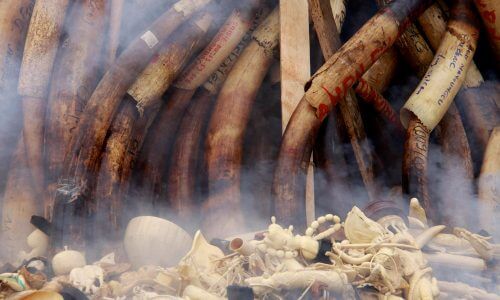Vietnam has always been a center of demand for rhinoceros horns, now following the tightening of controls in China, Vietnam is becoming a major market for "black goods".

According to a report by The organization to save the elephants Vietnam is becoming the main destination for rhinoceros horns and elephant tusks killed in Africa, this is mainly because of the activities of the Chinese government to eradicate the trade in ivory and its products.
Vietnam has always been a center of demand for rhinoceros horns, now following the tightening of controls in China, Vietnam is becoming a major market for "black goods". According to the report, in just a few years the amount of ivory passing through Vietnam increased by 600%. This is despite the fact that Vietnam is a member of the Convention on International Trade in Endangered Species of Wild Flora and Fauna (CITES) which prohibits trade in rhinoceros horns and elephant tusks, but because of local laws conditions are created that allow the offensive trade.
The researchers identified about 250 stalls that openly display over 16 thousand ivory sculptures, most of which circumvent the ban and are sold in China while ignoring the authorities. A border with a length of about 700 km becomes a path where parts of protected animals pass without restrictions.
Following global criticism, the authorities in China began to fight the trade in wild animals in general and the trade in ivory and rhinoceros horns in particular, a trade that in recent years has resulted in the killing of approximately 25 elephants and hundreds of rhinoceroses each year.
At the beginning of the year, the Chinese authorities announced a total ban on the import of tusks and ivory for 12 new years, while the global ban is until 2020. At the same time, and for the sake of the show, more than six hundred kilograms of smuggled tusks that were seized, as a result of the "strong hand" were crushed " of China the goods were directed to Vietnam.
The tusks are smuggled in many ways. The tusks are smuggled to the villages around the capital city of Hanoi, where they are engaged in carving the raw material and turning it into jewelry, sculptures and ornaments that are sold in China. Although in recent years ivory prices have dropped by half, the business of ivory is still profitable since the raw material costs about a thousand dollars per kg and the prices of the finished products increase by hundreds of percent, so that middlemen should continue to employ hunters.
Therefore, in order to stop the criminal killing, it is necessary to increase supervision and guarding in African countries in general and in East and West African countries in particular. In several countries, the supervision and guarding units are turned into military units and their equipment is improved with proper tools to fight poachers in order to deter the criminals.
In September, CITES representatives will meet in Johannesburg to discuss the continuation of the ban on trade in elephant tusks or a one-time sale permit for the ivory collected in the countries' warehouses. There are countries that demand to allow a one-time or even seasonal sale on the grounds that the market will be flooded and the hunter will become unprofitable, but the opponents claim that strengthening supervision in the countries of origin and in the countries where the demand is found would be the right solution.
Either way, it is hoped that a way will be found to stop the killing and that a savior will come to the elephants and rhinos.

2 תגובות
We are all disgusting. they too
The ugly side of Southeast Asia.